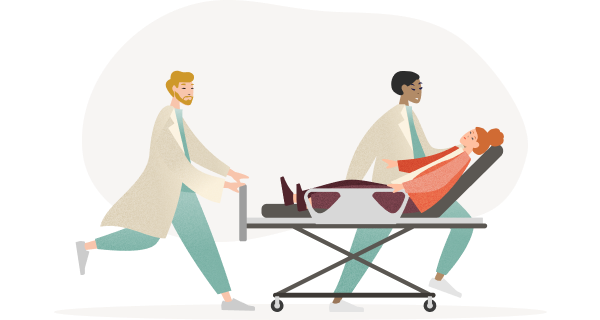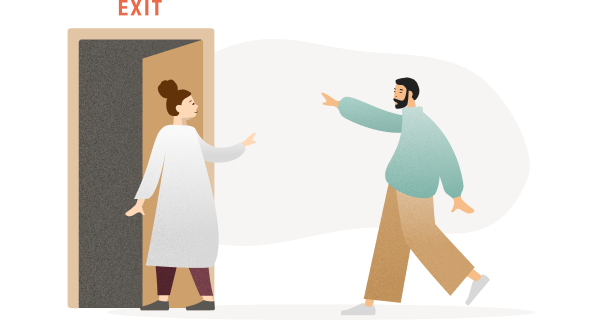

Know your rights when using health insurance
This page applies to all people in the United States who use most types of private health insurance.
The No Surprises Act is a federal law that went into effect on January 1, 2022.
The Act protects you from unexpected out-of-network bills from:
- Emergency room visits
- Non-emergency care related to a visit to an in-network:
- Hospital
- Hospital outpatient department
- Ambulatory surgical center
- Air ambulance services
These protections apply to you if you have health insurance through an employer (including a Federal Employees Health Benefits plan), the federal Health Insurance Marketplace, a State-based Marketplace, or other individual market coverage.
Emergency room care
During an emergency room visit
What is considered an "emergency room" visit?
On this website, emergency room refers to:
- Emergency rooms at a hospital
- Independent, freestanding emergency departments
- Any department of a hospital where you might get post-stabilization services
When you go to the emergency room, you’re protected from unexpected out-of-network charges (“surprise bills”) for emergency medical services in most cases.
If your health insurance covers emergency care, you can't be charged any more for emergency medical services than the in-network “cost-sharing” rate by:
- The hospital
- The providers giving you care at the hospital
- Your air ambulance provider (if you were taken to the hospital in an air ambulance)
Note: Some health plans don’t cover emergency care. If you’re unsure about what your plan covers, contact your insurance company or health plan.
What is “cost-sharing?”
Cost-sharing is when you're responsible for some of the cost of a medical item or service when using insurance to pay. Cost-sharing can take the form of a copayment, deductible, or coinsurance.
Currently, ground ambulance services aren't covered by billing protections in the No Surprises Act. They're still allowed to charge out-of-network rates and cost-sharing (unless they're not allowed to under state law). Learn what you can do if you get an out-of-network ground ambulance bill.
After an emergency room visit
Post-stabilization care
After an emergency room visit, you’re protected from unexpected out-of-network bills for post-stabilization services in most cases.
Sometimes, an out-of-network provider may ask you to sign a notice and consent form. By doing this, you give up your billing protections. Read about notice and consent forms for post-stabilization services.
What are “post-stabilization services?”
After an emergency room visit, you may need more services to stabilize your condition.
You may get these in:
- The emergency room
- Another department in the hospital
Planned, non-emergency room care
You may be seen by an out-of-network provider while getting care at an in-network facility. For example, your local hospital may be in-network, but an attending physician might be out-of-network.
You’re protected from out-of-network charges when you get care related to a visit to an in-network:
Hospital
Hospital outpatient department
An area of a hospital to care for people who don't need hospitalization or institutionalization.
Ambulatory surgical center
A place other than a hospital that does outpatient surgery. At an ambulatory surgery center, you may stay for only a few hours or for one night.
You may lose these billing protections if you sign a notice and consent form (read about notice and consent forms).
These protections don’t apply at other settings (like a doctor’s office that isn't a hospital outpatient department), or if you go to an out-of-network facility.
Exceptions
Ground ambulance services
Generally, ground ambulance services aren’t covered by billing protections in the No Surprises Act (unless a state law has different rules). They're still allowed to charge out-of-network rates.
Learn what you can do if you get an out-of-network ground ambulance bill.
Vision-only and dental-only insurance
These balance billing protections generally don’t apply to vision-only and dental-only insurance plans, but they may apply if vision or dental benefits are included in your health plan.
Short-term limited duration and health care sharing ministry plans
Services covered by these plans aren’t subject to the billing protections of the No Surprises Act.
Fixed indemnity excepted benefits plans, like hospital indemnity insurance
Services covered by these plans aren’t part of the billing protections of the No Surprises Act.
Do you use Medicare, Medicaid, Indian Health Services, Veterans Affairs Health Care, or TRICARE?
These plans already protect you from some unexpected out-of-network bills..
But if you have a billing issue, we can help. Answer a few questions, and we’ll find an action plan that works for you.
Signing a notice and consent form may increase your costs
If you’re scheduled for out-of-network care, a health care provider may ask you to sign a notice and consent form. Signing this form means that you agree to get care out-of-network and give up your protections from unexpected out-of-network bills.
If you don’t sign the notice and consent form, a provider or facility may refuse to provide non-emergency or post-stabilization care. You might have to reschedule care with a provider or facility in your health plan’s network to get care at in-network rates.
Your provider of facility may ask you to sign a notice and consent form if you are scheduled to get:
- Some types of care from an out-of-network provider at an in-network facility
- Post-stabilization services from an out-of-network provider or facility
You will likely have to pay more than if you got care in your health plan's network.
Signing the notice and consent form is your choice. You might choose to go out-of-network if you prefer a provider that isn't in-network.
What’s on the notice and consent form?
- An estimate of what your out-of-network care might cost.
- Information about your protections from surprise medical bills.
- The option to give up those protections and pay more for out-of-network care.
- For post-stabilization care: A list of in-network providers at the facility that can provide needed items or services.
View an example of a notice and consent form (PDF)
Notice and consent forms for post-stabilization services
You may get care in an emergency room. After your condition has stabilized, you might need additional care in that hospital to maintain your health (post-stabilization services).
Your provider can ask you to sign a notice and consent form for out-of-network post-stabilization services if you:
- Can travel to a nearby in-network provider without needing medical or emergency transportation
- Are in a condition to give informed consent
Your provider must follow rules when they give you a notice and consent form
Health care providers and facilities must answer your questions about the form, in person or over the phone.
And when they give you the form, it must be:
- Given separately from other documents. It can’t be attached to, or hidden within, your other paperwork.
- Given to you in the way you prefer, either printed on paper or emailed.
- Made available in any of the 15 most common languages spoken in the state where you got care. And if you speak a different language, they must give you access to an interpreter.
- Given to you in advance. Timing requirements vary based on when you scheduled your care.
If they didn’t follow these rules, submit a complaint to the No Surprises Help Desk.
You shouldn't get a notice and consent form in these situations:
In the emergency room: Federal law protects you from out-of-network bills for emergency services in hospitals, hospital outpatient departments, and independent, freestanding emergency department (unless you're getting post-stabilization services). Providers aren't allowed to ask you to give up those protections.
If there isn't an in-network provider who can provide the non-emergency item or service at the in-network facility.
From these specialists:
- These specialists are not allowed to ask you to sign a notice and consent form
-
- Assistant surgeons
- Hospitalists
Doctors who take care of patients when they are in the hospital across specialists. - Intensivists
Doctors who specialize in the care and treatment of patients in intensive care.
When getting items and services related to emergency medicine:
- Providers aren't allowed to ask you to sign a notice and consent form when they’re providing these items and services
-
- Emergency medicine providers or suppliers
- Anesthesiology
Anesthesia drugs are given before surgery so a person won't feel pain. - Pathology
The examination of bodies and body tissues. - Radiology
The use of medical imaging, such as X-ray, MRI, and ultrasound. - Neonatology
Care for newborn babies that require special treatment. - Diagnostic services, including radiology and laboratory services.
Have questions about the notice and consent form?
Before you sign, call the No Surprises Help Desk at 1-800-985-3059 with your questions. You can also talk to your insurer, provider, or a patient advocate.
When your provider leaves your health plan’s network
If you use most types of health insurance, you may be eligible for 90 days of in-network coverage after your provider leaves the plan’s network. “Continuing care patients” can get care from their provider at in-network rates for up to 90 days.
This includes patients that:
- Are undergoing treatment for a serious and complex illness
- Are undergoing institutional or inpatient care
- Are scheduled to get non-elective surgery
- Are pregnant and undergoing treatment
- Are terminally ill
Ask your provider if you fit this definition.
If your provider isn’t following these rules
Submit a complaint if you believe your provider isn't following the No Surprises Act.
Have questions or want to submit a complaint over the phone? Call the No Surprises Help Desk at 1-800-985-3059.
Understanding your bill
Learn how to read your bill, check your bill for errors, and read your explanation of benefits.
Other rights and protections
Read about other rights and protections that may apply to you:















